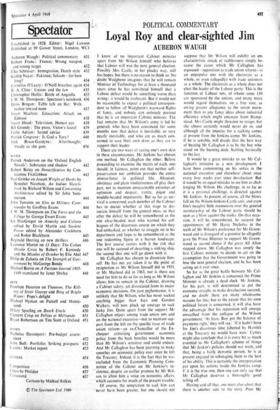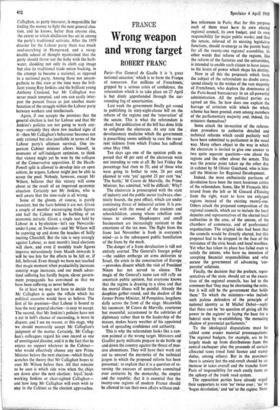Loyal Roy and clear-sighted Jim
POLITICAL COMMENTARY AUBERON WAUGH
I know of no important Cabinet minister apart from Mr Wilson himself who believes that Labour will win the next genCral election.
Possibly Mrs Castle, in her plucky way, still has hopes, but there is no reason to think so. No doubt Wedgbenn imagines that he will remain
' Minister of Technology for at least a thousand years since he has convinced himself that a
Labour defeat would be something worse than wrong: it would be irrelevant. But it would not be reasonable to expect a political correspon- dent to follow all Wedgbenn's wayward flights of fancy, and nobody can seriously pretend that he is an important Cabinet minister. The fact remains that Mr Wilson's army is led by generals who have been convinced for some months now that defeat is inevitable, or very nearly inevitable, and who are as much con- cerned to save their own skins as they are to support their leader.
There are two ways of saving one's own skin in these circumstances. Mr Jenkins has chosen one method, Mr Callaghan the other. Before proceeding to examine the merits of each, one should, in fairness, point out that neither self- preservation nor ambition provides the entire Motive-force in political life. Altruisni. obstinacy and plain vindictiveness all play their part, not to mention unreasonable extremes of optimism and despair, vanity, pique and muddle-headed impetuosity. But so far as sur- vival is concerned, each member of the Cabinet has to decide whether at this stage to dis- sociate himself from the general mess, so that after the defeat he will be remembered as the one clear-headed man who warned his col- leagues of the disastrous course on which they had embarked, or whether to struggle on in his department and hope to be remembered as the one redeeming figure in a barren landscape. The first course carries with it the risk that one will be accused of deserting a sinking ship, the second that one will go down with it.
Mr Callaghan has chosen to dissociate him- self. He has not yet taken it to the point of resignation as Mr Wilson himself did in 1951, or Mr Macleod did in 1963, nor is there any need for him to do so for as long as Mr Wilson allows him to remain in the Cabinet, drawing a Cabinet salary, yet dissociated from its major economic decisions. On past peiformance, it is unlikely that Mr Wilson, who has never sacked anything bigger than Jays and Gordon Walkers, will now pluck up courage to sack lucky Jim. Quite apart from the support Mr Callaghan enjoys among trade union Nes and on the national executive—not to mention sup- port from the left on the specific issue of trade union reform—an ex-Chancellor of the Ex- chequer criticising government economic policy from the back benches would be more than Mr Wilson's sensitive soul could endure. And Mr Callaghan has been yearning to make speeches on economic policy ever since he left the Treasury. Indeed, it is the fact that he was excluded from the Economic Planning Com- mittee of the Cabinet on Mr Jenkins's in- sistence, despite an earlier promise by Mr Wil- son to allow him a voice on economic affairs, which accounts for much of the present trouble.
Of course, the temptation to sack him can never have been greater, but one should not suppose that Mr Wilson will exhibit an un- characteristic streak of ruthlessness simply be- cause the cause which Mr Callaghan has espoused—opposition to trade union reform—is an unpopular one with the electorate as a whole, or even (allegedly) with trade unionists
as a whole. The electorate as a whole does not elect the leader of the Labour party. This is the function of Labour MPS, of whom some 130 are sponsored by the unions, and many more would regard themselves, on a free vote, as owing greater allegiance to the union move- ment than to any fancy ideas about industrial efficiency which might emanate from Hamp- stead. Mrs Castle might threaten to resign, but she almost certainly would never do so, and although all the impetus for a sacking comes at present from the Jenkins camp, Mr Jenkins, if he is sensible, will decide that the best way of beating Mr Callaghan is to be the boy who stood on the burning deck, battling heroically to the last.
It would be a great mistake to see Mr Cal- laghan's initiative as a new development. I have been commenting on his antics in the national executive and elsewhere about once every four weeks ever since devaluation. But it would be an equal mistake to see him as chal- lenging Mr Wilson. His challenge, in so far as it is a personal challenge, is directed against Mr Jenkins. At present, of course, all the blows fall on the Wilson-Jenkins-Castle axis, and even Jim's naughty little manoeuvre over the general secretaryship of the Labour party should be seen as a blow against the troika. On that occa- sion, it will be remembered, he secured the- appointment of Mr Harry Nicholas in the teeth of Mr Wilson's preference for Mr Green- wood and in disregard of a promise he allegedly gave the Prime Minister to support Mr Green- wood as second choice if the great All Allen stepped down. Mr Callaghan was simply the first Cabinet minister to decide to act on the assumption that the Government was going to lose the next general election, and he has been acting on it ever since. So far as the great battle between Mr Cal- laghan and Mr Jenkins is concerned the Prime Minister is already a dead duck. Mr Jenkins, for his part, is still determined to put the economy straight, to make devaluation succeed, and no doubt there are many wholesome reasons for this; but to the extent that his own political future is concerned, it will also have the advantage that his reputation will emerge unscathed from the collapse of the Wilson government. 'At least, Roy got the balance of payments right,' they will say : 'if it hadn't been for Jim's disastrous time (abetted by Harold) at the Treasury we would have won.' Cynics might also conclude that it is every bit as much essential -to Mr Callaghan's scheme of things that Mr Jenkin's policies should not work, and that, being a fairly dynamic person, he is at present engaged in sabotaging them to the best of his ability. This is certainly the interpretation put upon his actions inside the Jenkins camp. If it is the true one, then one can only say that Mr Callaghan deserves a thoroughly good telling off.
Having said all that, one must also admit that there is another side to the story. Poor Mr
Callaghan, as party treasurer, is responsible for finding the money to figllt the next general elec..
tion, and he knows, better than anyone else, the extent to which disillusion has set in among the party's traditional activists. After the 1959 disaster for the Labour party there was much soul-searching in Hampstead, and a recog- nisable school of thought maintained that the party should throw out the baby with the bath- water, shedding not only its cloth cap image but also its traditional trade union backing, in the attempt to become a national, as opposed to a sectional party. Among those not unsym- pathetic to this view at the time were the bril- liant young Roy Jenkins and the brilliant young Anthony Crosland, but Mr Callaghan was never much tempted, and one can easily inter- pret the present fracas as just another mani- festation, of the struggle within the Labour party between workers and intellectuals.
Again, if one accepts the premises that the general election is lost for Labour and that Mr Jenkins's policies are not going to work any- way—certainly they show few marked signs of it—then Mr Callaghan's behaviour becomes not only rational but also justifiable in terms of the Labour party's ultimate survival. One im- portant Cabinet minister allows himself, in moments of self-indulgent optimism, to think that victory might yet be won by the collapse of the Conservative opposition. If the Heath- Powell split is allowed to develop into an open schism, he argues, Labour might just be able to scoop the pool. Nobody, however, except Mr Wilson, believes that this victory will come about as the result of an improved economic situation. Certainly not Mr Jenkins, who is well aware that the time-scale is all wrong.
Some of the gloom, of course, is purely transient, but the facts behind it are not. Given a couple of months' encouraging trade figures and half the Cabinet will be burbling of an economic miracle. Given a single seat held by Labour in a by-election—let's say Newcastle- under-Lyme, or Swindon—and Mr Wilson will be capering up and down the beaches of Scilly reciting Churchill. But the tide is very strongly against Labour, as next month's local elections will show, and even if monthly trade figures improve miraculously from March onwards it will be too late for the effects to be,felt or, if felt, believed. Even though we have not reached that magic moment when productivity increases outstrip wage increases, and our much adver- tised suffering has hardly begun, clever govern- ment propaganda has convinced us that we have been suffering as never before.
So at least we may not have to decide that Mr Callaghan is quite the villain which his political assassins would have us believe. The first of his premises—that Labour is bound to lose the next general election—is easy to accept. The second, that Mr Jenkins's policies have not a cat in hell's chance of succeeding, is more in dispute, and I see no reason, at this stage, why we should necessarily accept Mr Callaghan's judgment of the matter. Certainly, Mr Callag- han's colleagues regard his own record as one of unmitigated disaster, and it is the fact that he enjoys no support whatever in the Cabinet— who would effectively choose any new Prime Minister before the next election—which finally scotches the theory that Mr Callaghan hopes to oust Mr Wilson before then. All that remains to be seen is which side wins when the4 chips are down after the next election : loyal, hard- working Jenkins or clear-sighted Callaghan— and how long Mr Callaghan will even wish to stay in the Cabinet as the election approaches.



































 Previous page
Previous page